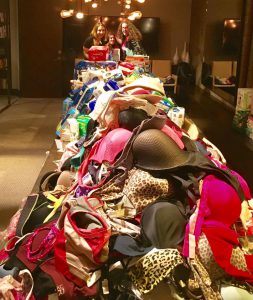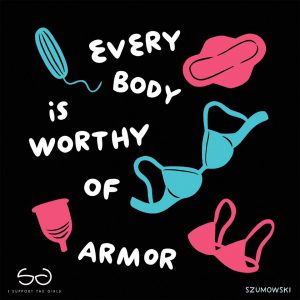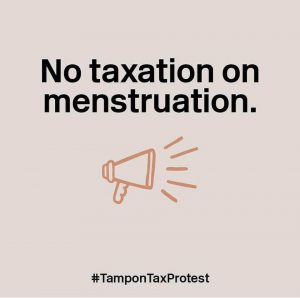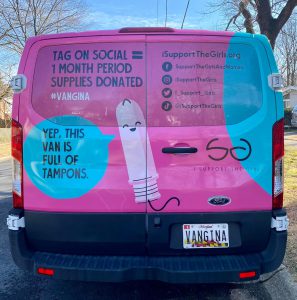Imagine having to live on the streets or in a shelter because of your economic circumstances, or having to flee your home because of violence or a natural disaster. It’s hard to wrap your head around something of that magnitude, isn’t it? But it might be even harder to imagine what your actual day-to-day life would be like in that situation. What necessities would you have to go without, and what seemingly little things that maintain your dignity would you lose access to? For women, it could mean going without the most basic hygiene products, or without the comfort of a clean bra. While many of us might not stop to think about these “little” things or might not know about the need that is out there, Dana Marlowe, founder of the nonprofit organization, I Support the Girls, is here to spread the word – and all the donated the tampons, pads, and bras she can get her hands on to women in need.
“Those Four Words Were Seemingly Innocuous…”

Dana Marlowe is no stranger to thinking about how to make the world a more equal place. Since 1994, her work – and her passion – has been making sure that the digital tech space is accessible for all. She audits websites, software apps, and mobile apps to make sure that tech is usable for everyone, and that everyone has equal access to education, social interaction, shopping, tourism, and everything else that technology has to offer its users. But menstrual equity (or the right of equal access to menstrual hygiene products) or the right for all to clean, comfortable underwear? That wasn’t on her radar so much. That is, not until one fateful day in a suburban mall.
“This is not the normal kind of weight loss success story,” Marlowe told me. Her story started out in a familiar way: after the birth of her second child, she realized she had gained some weight, so she changed her lifestyle, and was successful at dropping an impressive 35 pounds. But that’s not the success she means; her weight loss inadvertently led to her founding I Support the Girls.
“After losing weight, I needed new bras, and I had lost so much weight that I didn’t really know what size I was. So I went to the local mall, got fitted, bought some new bras…and realized I had all these perfectly good bras that didn’t fit me anymore, so I asked the sales associate what I could do with them. So she told me in this tiny little dressing room, ‘homeless women need bras.’ Those four words were seemingly innocuous, but they basically changed my whole course – and I didn’t anticipate that happening while half naked in a dressing room in a suburban mall!”
As an obvious woman of action, Marlowe got on it. She contacted a local shelter in Washington D.C. and asked if she could donate, and how she could go about doing it. “The guy immediately said, ‘How soon can you get them here?’ And I was like, ‘Oh! If I didn’t know that homeless women need bras, what else don’t I know?’” So she asked what else they might need and, without missing a beat, the man at the shelter told her, “We REALLY REALLY need pads and tampons.” According to Marlowe, “I had never thought up until that moment what it must be like to be living on the streets and have your period, a whole week at a time and not have any extra products to help you manage it.”
“Don’t Ever Underestimate the Power of Neighborhood Moms’ Groups!”
Realizing that not everyone has access to hygiene products was a sobering thought for Marlowe. So she went to Costco, stocked up on hygiene products and put them with her pile of 16 freshly washed, gently used bras. Then she had another fateful encounter, this time with her best friend. While taking a walk, she told her about her plan to donate.

“My friend said, “Oh my god, I didn’t know that you could donate your bras! Can I give you mine?’ She’d had three children, and had lots of different bras in different sizes – and we ended up with 46 bras altogether! Now, my friend is a lawyer, she’s smart and savvy and she didn’t know about this need, so I figured maybe most people didn’t think about this. So I posted on social media, asking for donations. I figured I’d do a two-week collection. That was back in July 2015, but I’m still doing it! Don’t ever have me project manage anything!” she laughed.
Her post exploded, and was shared hundreds of times. “People went crazy to donate,” according to Marlowe, and what started as two friends gathering a few supplies turned into ever-growing porch pickups and collection sites around D.C. and Virginia, at coffee shops, yoga studios, and schools. Boxes even arrived from overseas. In the end, her first donation totaled an unbelievable 1,000 bras and 7,000 hygiene products.
Three things had become clear to Marlowe. These products were very, very needed; people were willing and able to give (“Moms always have bras shoved in the backs of their drawers that they never use!” according to Marlowe); and this one-time collection didn’t need to be the end of her involvement in this issue. She was getting lots of attention for her work: people in other cities were reaching out, other social service agencies were getting in touch with her, and even the Washington Post picked up her story. And thus, Dana’s Bra Project was born. “But Dana’s Bra Project wasn’t quite right so I called it I Support the Girls because of the double entendre.”
Marlowe knew that I Support the Girls’ model was scaleable, and she set out to prove it was replicable, with an FAQ page and guidebook on her website, as well as four pilot studies. She found it was not just a local need, and that her model could absolutely be replicated. From there, she launched ISTG’s first program: their affiliate network. Now, ISTG has 50 affiliate chapters in the U.S. and 4 in other countries, and they’ve donated 12.5 million products to date.
In addition to the affiliate network, ISTG also branched out into specifically supporting women affected by natural disasters (“Periods don’t stop for hurricanes!”) and women fleeing domestic violence situations. According to Marlowe, “Domestic abuse victims don’t usually have hygiene products in their go bags. No organization tells them to pack them in their go bags, and we realized this was a big issue.”
So how does she credit the immediate success of I Support the Girls? According to Marlowe, “Never underestimate the power of neighborhood moms’ groups!”
“These Are Real Conversations That People Have to Have”

So what is the impact of all of this? Well, the numbers are one thing, but it’s hearing the stark reality of what it means to be without basic necessities that makes you realize just how much ISTG’s work is needed. “We hear heartbreaking stories all the time. A lot of people have to choose every month between pads and a hot meal. People have to choose between feeding their children or getting pads, or getting pads for their teenage daughters. These are real conversations that people have to have.” Considering that the average woman spends around $120 a year on hygiene products, and knowing how much a new bra can cost, it’s no wonder that these conversations are happening all over our country.
And when women and girls have to go without? Lack of menstrual products can contribute to loss of educational opportunity for impoverished teens, and many menstruators experiencing homelessness have reported infection caused by prolonged use or improvisation of menstrual products. Not having a bra to wear can even impact a struggling woman’s ability to get a job.
Hearing Marlowe talk about what women are going through is tough to hear. “Women are using bras that are 10 years old, the underwire is poking out and making them bleed, the sweaty, grimy straps are chafing their shoulders. Many women that I’ve met are keeping their breasts up with old cracked leather belts or are managing their period with ripped up cardboard, insides of mattresses – that’s not ok!”
But there is hope. I Support The Girls is growing, and is making a difference in women’s lives. For example, Marlowe told me the story of one woman, Crystal:
I met her in DC at a homeless shelter…and I asked her a few questions. I asked her what she wanted, she said nobody ever really asked her that. She said, “I’d really love a red lacy bra and I also want a sports bra. While we’re looking for the right ones for her, she said you know, I’ve had the bra I’m wearing for 9 years, but I’m always afraid to wash it because then it’ll be wet…I just want a red sexy bra so i can feel sexy too. You always see those models on magazine covers wearing them and I want to feel sexy. And the thing about a bra is it’s always under your layers” – and she was in sooo many layers that day – “my life isn’t always safe, but nobody has to know it’s there so it won’t make me unsafe, but I’ll know it’s there and it’ll be close to my heart. And I asked her why she wanted a sports bra. She said, “Well, again, shelters are not safe and I don’t have a safe place to keep my most treasured possessions.” See, she used to be an artist, and she had a treasured painting that she kept with her, all folded up, and she wanted to keep that and all of her valuables in her sports bra – she got all of it!

“It Needs to Be Normalized”
Dana Marlowe and the organization that she “started by accident,” as she says, are proof that a small realization can spark a big movement. But it’s also up to all of us to help make change. So what can we do? In practical terms, Marlowe asks us to “Find those old bras, wash them, and mail them to us! If you’re able to donate hygiene products, that’s awesome!”
We also need to use our voices, if we’re in the position to do so. She urges us to “Reach out to your legislature to find out if there’s a tax on hygiene products. 35 states still have taxes on hygiene products, so they’re just not provided for free in public spaces. You can also ask if there’s a bill on the table that includes providing free menstrual products in public places, just like toilet paper.”
There’s also something that’s both easier and harder for us to do: be part of the incremental change toward normalizing periods and the products that women – more than half of our population! – need. “There’s still a huge taboo and stigma that persists around the topic of menstruation – like using euphemisms like ‘Aunt Flo’, hiding tampons up your sleeve in class so nobody has to see it, but these perpetuate the stigma and the taboo – so part of it is to keep talking about it on all different types of platforms, social media, etc,” said Marlowe.
It’s easy to talk on social media, but not so easy to change thousands of years of culture. But we have to keep trying. Said Marlowe, “How does change happen? Slowly sometimes. But think of this, my son was so proud that he knew all of the period facts and could answer all of the questions when they were talking about the subject in school. So, on the quick side, all 20 of those kids in his class saw that a boy knew all of the period answers and it normalized it for them! He said it the same way he said ‘I’d like a cheeseburger and fries’, it normalized it for all of those kids.”
So we’re getting there. In the meantime, we can help Dana Marlowe and I Support the Girls provide much needed necessities, comforts, and dignity to women in need. To learn more about I Support The Girls, and find out how you can help, head to their website.
